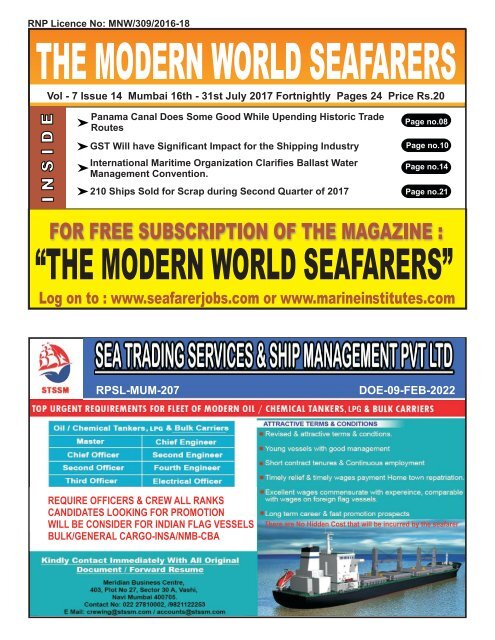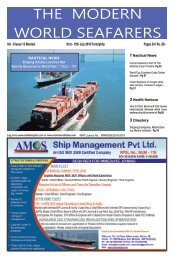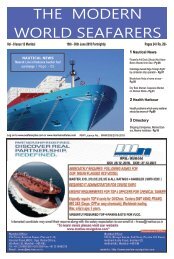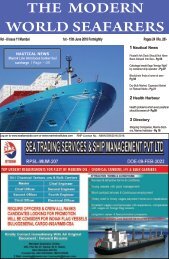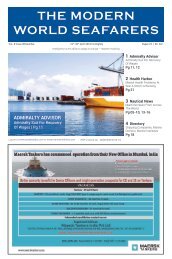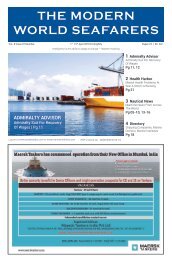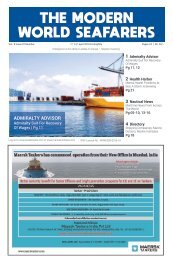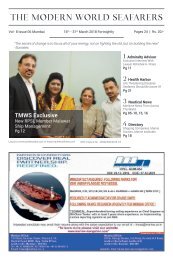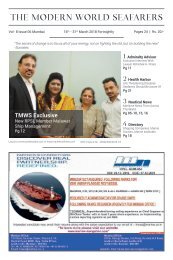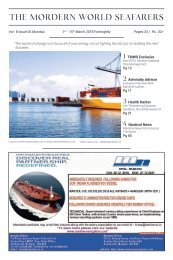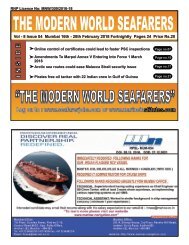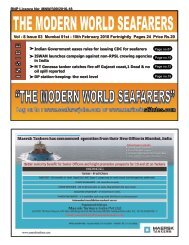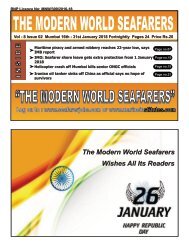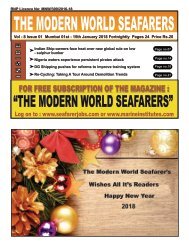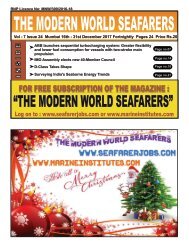issue 16th-31st-July-17
Create successful ePaper yourself
Turn your PDF publications into a flip-book with our unique Google optimized e-Paper software.
RNP Licence No: MNW/309/2016-18<br />
Vol - 7 Issue 14 Mumbai <strong>16th</strong> - <strong>31st</strong> <strong>July</strong> 20<strong>17</strong> Fortnightly Pages 24 Price Rs.20<br />
Panama Canal Does Some Good While Upending Historic Trade<br />
Routes<br />
GST Will have Significant Impact for the Shipping Industry<br />
International Maritime Organization Clarifies Ballast Water<br />
Management Convention.<br />
210 Ships Sold for Scrap during Second Quarter of 20<strong>17</strong><br />
Page no.08<br />
Page no.10<br />
Page no.14<br />
Page no.21<br />
RPSL-MUM-207<br />
DOE-09-FEB-2022<br />
REQUIRE OFFICERS & CREW ALL RANKS<br />
CANDIDATES LOOKING FOR PROMOTION<br />
WILL BE CONSIDER FOR INDIAN FLAG VESSELS<br />
BULK/GENERAL CARGO-INSA/NMB-CBA<br />
There are No Hidden Cost that will be incurred by the seafarer
<strong>16th</strong> - <strong>31st</strong> <strong>July</strong> 20<strong>17</strong> THE MODERN WORLD SEAFARERS 02
<strong>16th</strong> - <strong>31st</strong> <strong>July</strong> 20<strong>17</strong> THE MODERN WORLD SEAFARERS 03<br />
Register and Submit your Resume to Double your Chance<br />
of Getting the Right Job.<br />
Submitting your resume to us is a great way to forward your resume directly to many companies.<br />
To get started just Logon to www.seafarerjobs.com. (Free Register for candidates)<br />
For any query contact us on info@seafarerjobs.com<br />
A Division of Acrux Shipping Pvt. Ltd.<br />
Our Network:<br />
www.seafarerjobs.com / www.seafarerblog.com /<br />
www.marineinstitutes.com / www.onlinefreightsolutions.com
<strong>16th</strong> - <strong>31st</strong> <strong>July</strong> 20<strong>17</strong> THE MODERN WORLD SEAFARERS 04
<strong>16th</strong> - <strong>31st</strong> <strong>July</strong> 20<strong>17</strong> THE MODERN WORLD SEAFARERS 05
<strong>16th</strong> - <strong>31st</strong> <strong>July</strong> 20<strong>17</strong> THE MODERN WORLD SEAFARERS 06<br />
Wartsila ensures compliance with the Polar Code with water<br />
lubricated stern tube solutions<br />
1 January 20<strong>17</strong> was a historic milestone in the protection of our polar waters for future<br />
generations. On that day, International Maritime Organization's (IMO) International Code for Ships<br />
Operating in Polar Waters (the Polar Code) came into force. The Polar Code is aimed at<br />
protecting ships and the people aboard them, both seafarers and passengers, in the harsh<br />
environment of the waters surrounding our two poles, Arctic and Antarctic.<br />
The Polar Code covers the full range of shipping-related matters relevant to navigation in waters<br />
surrounding the two poles, including ship design, construction and equipment as well as<br />
operational and training concerns. Also, search and rescue, the protection of the unique<br />
environment and eco-systems of the Polar Regions are covered by the Code.<br />
The Polar Code and other initiatives within the marine industry have spawned a new era of<br />
environmentally friendly products. “In Wartsila, we strongly welcome any incentives for the further<br />
preservation of ecosystems and protection of the sea. We are also a strong promoter of water<br />
lubricated solutions that assist shipowners and operators to comply with the Polar Code and other<br />
environmental regulations,” says Benjamin Tornberg, Merchant Segment Manager at Wartsila<br />
Seals and Bearings.<br />
Reducing the risk of bearing failure with water lubricated solutions<br />
Wartsila's water lubricated solutions are approved by all major classification societies and range<br />
from complete stern tubes with composite plain bearings to stern tube seals, water quality<br />
systems, journals, shaft coating and advanced condition measurement systems.<br />
“The benefit of using a water lubricated solution can be summarised very easily – no oil. With no<br />
oil comes no cost of oil, no maintenance of oil, no risk of oil leakage or the fines that come with it,”<br />
says Tornberg. “However, the main benefit of opting to replace oil with water is the reduced risk<br />
of a bearing failure. An oil lubricated system relies heavily on the performance of the aft seal. In<br />
the event of aft seal malfunction, which is the most common reason for stern tube oil spillage and<br />
bearing breakdowns, the entire bearing system is in jeopardy. The results can be catastrophic,<br />
not only for the seals and bearings, but more importantly for the shaft,” Tornberg explains.<br />
In a water lubricated stern tube system, the water quality system maintains the flows and<br />
temperatures inside the stern tube and controls the environment the bearings are functioning in.<br />
When you are controlling the operating environment, you can ensure that the bearings will always<br />
perform in, or as close as possible, to its optimal conditions.<br />
Vessels operating in the extreme conditions of Polar Regions don't have to choose oil as their<br />
main propeller shaft lubricant due to low water temperatures. This makes water lubricated<br />
systems even more attractive. “The modern water lubricated stern tube systems can be supplied<br />
either as open looped or closed looped systems. Selecting a closed looped system for particularly<br />
cold environments allows the operator to mix anti-freeze fluids, such as glycol, into the circulating<br />
water. This makes it possible to have the benefits of a water lubricated system even in very cold<br />
conditions,” Tornberg concludes.
<strong>16th</strong> - <strong>31st</strong> <strong>July</strong> 20<strong>17</strong> THE MODERN WORLD SEAFARERS 07
<strong>16th</strong> - <strong>31st</strong> <strong>July</strong> 20<strong>17</strong> THE MODERN WORLD SEAFARERS 08<br />
Panama Canal Does Some Good While Upending Historic Trade<br />
Routes<br />
Fresh from a $5.25 billion, nine-year expansion that's upending decades-old trade routes, it turns<br />
out the Panama Canal is also doing a little good for the planet.<br />
By offering a short-cut to deliver billions of dollars of Asian-made goods to America's East Coast<br />
ports, the waterway has helped its shipping company customers to lower their collective carbon<br />
emissions by <strong>17</strong> million metric tons during the first full year of operation. When the expansion was<br />
planned, the authority's internal forecast was 9.6 million tons, according to Alexis Rodriguez,<br />
environment protection specialist at the Panama Canal Authority.<br />
For Panama, successfully combating climate change could be pivotal to the country's future. The<br />
canal is filled by waters that have flowed for centuries down from the country's mountains. There<br />
have been times in the past few years when low water levels forced the canal to impose minor<br />
restrictions on the ships it allowed through.<br />
“If we don't take measures to cut pollution then we will all suffer in our pockets,” Rodriguez said in<br />
an interview in London, where he was attending a meeting of global governments to discuss the<br />
shipping industry's contribution to combating climate change.<br />
As well as helping Asian manufacturers to deliver goods to the U.S. east coast faster, the widened<br />
canal has redrawn commodity trade routes. America's booming energy supplies — particularly<br />
liquefied gases and even oil — are flowing in the opposite direction like never before. The link can<br />
also be used to haul iron ore, coal and grains to Asia from places like Brazil, Colombia and<br />
Argentina.<br />
Shorter journeys, better ships<br />
The boost to the environment comes from the fact bigger, more efficient ships are now going<br />
through. Critically, they can shave thousands of miles off journeys, meaning they consume much<br />
less fuel.<br />
Panama's support for tougher environmental rules for shipping, which also includes promoting<br />
limits on sulfur emissions, stems partly from a desire to avoid any longer-term threat to the canal's<br />
water levels, Rodriguez said.<br />
The authority now expects its customers to save about 320 million tons of CO2 in the first decade<br />
of the expanded operation, said Rodriguez. That's about double the amount it anticipated when<br />
the expansion was planned. It's also about the same as Spain's annual emissions.<br />
He spoke as more than 200 government and industry representatives met in London to discuss<br />
how to cut carbon emissions from shipping operations to zero by the second half of the century,<br />
down from as much as 3 percent of global emissions now. They met at the International Maritime<br />
Organization, the United Nations' shipping agency.<br />
Imposing mandatory emissions rules would close a loophole left by the 2015 Paris climate<br />
agreement. Ships engaged in international maritime trade mostly burn heavy fuel oil, one of the<br />
dirtiest and cheapest forms of energy. IMO members will return to discuss their levels of ambition<br />
in October and an agreement could be drafted by next year.
<strong>16th</strong> - <strong>31st</strong> <strong>July</strong> 20<strong>17</strong> THE MODERN WORLD SEAFARERS 09
<strong>16th</strong> - <strong>31st</strong> <strong>July</strong> 20<strong>17</strong> THE MODERN WORLD SEAFARERS 10<br />
GST Will have Significant Impact for the Shipping Industry<br />
It remains to be seen how the shipping and logistics sector adapts to the new changes brought<br />
about by the GST. Although there are concerns that the sector might be adversely affected.<br />
The Goods and Services Tax (GST) is in. One of the sectors affected by it is the shipping industry.<br />
In fact, freight and logistics and shipping are the center of the law. GST contains extensive<br />
provisions for State Goods and Service Tax (SGST); Central Goods and Service Tax (CGST);<br />
Integrated Goods and Service Tax (IGST) and other factors connected with supply of goods and<br />
services, time and place of supply, input tax credit, valuation, and provisions of transition. Exports<br />
are zero-rated supply while imports are charged at the same rates as those on domestic goods<br />
and services, sticking to the destination principle.<br />
Understanding GST provisions for shipping industry of India<br />
Currently, if goods are transported as cargo through ships, outbound shipment is considered<br />
exports, whereas inbound shipments attract service tax. If transportation is through air, inbound<br />
and outbound shipments are not subject to service tax. Tax liability, connected with ancillary items<br />
like warehousing, cargo handling, and terminal charges are determined based on taxability of<br />
principal service.<br />
Since GST does not specify exclusion for air compared to ocean freight, transactions, when place<br />
of supply is inside taxable territory, would be levied with air and ocean freight charges with<br />
respect to GST.<br />
“Thus converting logistics and freight forwarding into a supply of services, which includes<br />
movement of goods by sea, inland waterways, air, rail, or road. GST on freight depends on<br />
whether transportation is national or international,” says Shashank Dixit, CEO, Deskera,<br />
a cloud-based business software provider<br />
Moreover, while considering domestic freight, transportation needs to happen from a place in<br />
India to another place in the country. Basically, both points of origin and destination have to be in<br />
India. On the contrary, International freight rules are applied when transportation takes place and<br />
when either place of origin or place of destination or both are outside India.<br />
So, impact is in provisions of 'Place of Supply' to determine taxability of cross-border and<br />
within-state transactions. According to GST provisions, Place of Supply for transportation is<br />
defined as follows: (a) location of recipient if recipient is GST-registered entity; and (b) if recipient<br />
is unregistered entity, place of supply deemed as place where goods are given over for<br />
transportation.<br />
It remains to be seen how the shipping and logistics sector adapts to the new changes brought<br />
about by the GST. Although there are concerns that the sector might be adversely affected.
<strong>16th</strong> - <strong>31st</strong> <strong>July</strong> 20<strong>17</strong> THE MODERN WORLD SEAFARERS 11
<strong>16th</strong> - <strong>31st</strong> <strong>July</strong> 20<strong>17</strong> THE MODERN WORLD SEAFARERS 12
<strong>16th</strong> - <strong>31st</strong> <strong>July</strong> 20<strong>17</strong> THE MODERN WORLD SEAFARERS 13<br />
FOR VALLES STEAMSHIP (CANADA) LTD<br />
FOR THOME SHIP MANAGEMENT, SINGAPORE<br />
VLCC/ AFRAMAX / CHEMICAL TANKER / LPG<br />
MASTER<br />
CHIEF OFFICER<br />
ELECTICAL OFFICER<br />
BULK CARRIERS<br />
MASTER<br />
CHIEF OFFICER<br />
<br />
AFRAMAX TANKER<br />
CHIEF OFFICER (with 18 months rank Experience)<br />
PUMPMAN<br />
FOR FPSO<br />
CHIEF ENGINEER (URGENT)<br />
SECOND ENGINEER<br />
CHIEF ENGINEER<br />
SECOND ENGINEER<br />
FOR OTHER FOREIGN PRINCIPALS<br />
FOR AFRAMAX TANKER<br />
ALL OFFICERS &<br />
RATINGS } For Takeover Vessels<br />
<br />
<br />
407 / 411 / 311 OBEROI CHAMBERS II<br />
645/646 NEW LINK ROAD<br />
ANDHERI (W), MUMBAI 400 053<br />
TEL: +91 22 6640 9000<br />
TEL: +91 22 2674 4447 / 48 / 49 / 50<br />
FAX: +91 22 2674 3300<br />
E-MAIL: marineoperations@ocs.services<br />
THIRD ENGINEER (With Indian Steam COC)
<strong>16th</strong> - <strong>31st</strong> <strong>July</strong> 20<strong>17</strong> THE MODERN WORLD SEAFARERS 14<br />
International Maritime Organization Clarifies Ballast Water<br />
Management Convention.<br />
The International Maritime Organization (IMO), the United Nations agency charged with regulating<br />
international shipping, has progressed its environmental agenda at the recent meeting of its<br />
Marine Environment Protection Committee (MEPC), 71st session (3-7 <strong>July</strong>). The Committee<br />
clarified the ballast water management schedule, progressed GHG and air pollution <strong>issue</strong>s,<br />
adopted new NOx emission control areas, designated a further Particularly Sensitive Sea Area<br />
and agreed to work on implementation of the 0.50% global sulphur limit.<br />
This work is helping IMO to fulfil its mandate to protect oceans and human health and to mitigate<br />
climate change, in line with the UN Sustainable Development Goals (SDGs), particularly SDG<br />
14 (oceans) and SDG 13 (climate change).<br />
Ballast Water Management Convention clarity<br />
The MEPC agreed a practical and pragmatic implementation schedule for ships to comply with<br />
the IMO Ballast Water Management (BWM) Convention, which aims to stem the transfer of<br />
potentially invasive species in ships' ballast water.<br />
The treaty enters into force on 8 September 20<strong>17</strong>. Currently, the BWM Convention has been<br />
ratified by 61 countries, representing 68.46% of world merchant shipping tonnage.<br />
From the date of entry into force, ships will be required to manage their ballast water to avoid the<br />
transfer of potentially invasive species. All ships will be required to have a ballast water<br />
management plan and keep a ballast water record book. Ships will be required to manage their<br />
ballast water to meet the so-called D-1 standard or D-2 standard.<br />
The D-1 standard requires ships to conduct the exchange at least 95% of their ballast water by<br />
volume such that at least 95% of water by volume is exchanged far away from the coast where it<br />
would will be released.<br />
The D-2 standard requires ballast water management to restrict to a specified maximum the<br />
amount of viable organisms allowed to be discharged and to limit the discharge of specified<br />
indicator microbes harmful to human health.<br />
Draft amendments to the treaty approved by the MEPC clarify when ships must comply with the<br />
requirement to meet the D-2 standard.<br />
The draft amendments will be circulated after the entry into force of the BWM Convention on 8<br />
September 20<strong>17</strong>, with a view to adoption at the next MEPC session (MEPC 72 in April 2018).<br />
Under the approved amendments, new ships, i.e., ships constructed on or after 8 September<br />
20<strong>17</strong>, shall conduct ballast water management that at least meets the D-2 standard from the date<br />
they are put into service. For existing ships, i.e., ships constructed before 8 September 20<strong>17</strong>, the<br />
date for compliance with the D-2 standard is linked with the renewal survey of the ship associated<br />
with the International Oil Pollution Prevention Certificate under MARPOL Annex I. For existing<br />
ships this would be the first or second five-year renewal survey after 8 September 20<strong>17</strong>:<br />
• By the first renewal survey: this applies when that the first renewal survey of the ship takes<br />
place on or after 8 September 2019 or a renewal survey has been completed on or after 8<br />
September 2014 but prior to 8 September 20<strong>17</strong>.<br />
Cont. To Page.....15
<strong>16th</strong> - <strong>31st</strong> <strong>July</strong> 20<strong>17</strong> THE MODERN WORLD SEAFARERS 15<br />
International Maritime Organization Clarifies Ballast Water<br />
Management Convention.<br />
Cont. From Page.....14<br />
• By the second renewal survey: this applies if the first renewal survey after 8 September 20<strong>17</strong><br />
takes place before 8 September 2019. In this case, compliance must be by the second<br />
renewal survey (provided that the previous renewal survey has not been completed in the<br />
period between 8 September 2014 and 8 September 20<strong>17</strong>).<br />
An existing ship to which the IOPP renewal survey under MARPOL Annex I does not apply<br />
shall meet the D-2 standard from the date decided by the Administration, but not later than 8<br />
September 2024.<br />
The MEPC adopted a resolution which resolves that Parties to the BWM Convention should<br />
implement the schedule for compliance outlined in the draft amendments, ahead of their<br />
adoption and entry into force.<br />
In other work focusing on implementation of the BWM treaty, the MEPC, inter alia:<br />
• adopted the 20<strong>17</strong> Guidelines for ballast water exchange (G6);<br />
• adopted the 20<strong>17</strong> Guidelines for risk assessment under regulation A-4 of the BWM<br />
Convention (G7);<br />
• adopted an MEPC resolution on ‘The experience-building phase associated with the BWM<br />
Convention’;<br />
• approved the Code for approval of ballast water management systems, and approved draft<br />
amendments to the BWM Convention to make the Code mandatory, for adoption at the next<br />
session;<br />
• approved amendments to section E (Survey and certification) of the BWM Convention, also<br />
for adoption at MEPC 72;<br />
• approved a manual on ‘Ballast Water Management – How to do it’;<br />
• approved Guidance on contingency measures under the BWM Convention;<br />
• approved a circular on Application of the BWM Convention to ships operating in sea areas<br />
where ballast water exchange in accordance with regulations B-4.1 and D-1 is not possible;<br />
• granted final approval to one and basic approval to two ballast water management systems<br />
that makes use of active substances.
<strong>16th</strong> - <strong>31st</strong> <strong>July</strong> 20<strong>17</strong> THE MODERN WORLD SEAFARERS 16
<strong>16th</strong> - <strong>31st</strong> <strong>July</strong> 20<strong>17</strong> THE MODERN WORLD SEAFARERS <strong>17</strong>
<strong>16th</strong> - <strong>31st</strong> <strong>July</strong> 20<strong>17</strong> THE MODERN WORLD SEAFARERS 18<br />
Nearly three quarters of cargo ships over 20,000 gt compliant<br />
with ECDIS deadline<br />
Almost three-quarters of cargo ships over 20,000 gross tonnage are already compliant with the<br />
SOLAS-mandated Electronic Chart Display and Information System (ECDIS) deadline of 1st <strong>July</strong><br />
20<strong>17</strong>, according to the latest figures published by the United Kingdom Hydrographic Office<br />
(UKHO).<br />
The UKHO estimates that a further 3,828 cargo ships over 20,000gt are yet to make the transition<br />
to using an ENC (Electronic Navigational Chart) service and therefore do not yet meet SOLAS<br />
(Safety of Life at Sea) regulations on ECDIS carriage. The amendment to SOLAS Chapter V<br />
regulation 19.2 requires ships engaged on international voyage to be fitted with an ECDIS no later<br />
than the first survey on or after a date based on the type of ship and its size in gross tonnage.<br />
Only ENCs supplied from official hydrographic offices can be used in ECDIS to meet SOLAS<br />
requirements for nautical charts and to be considered ECDIS ready.<br />
Twelve months ago the SOLAS regulations on ECDIS carriage were extended to cover cargo<br />
ships over 50,000gt. Today, 90% of these larger cargo ships are now considered ECDIS ready.<br />
Emphasising the importance of compliance, Thomas Mellor, Chair of the International<br />
Hydrographic Organization's ENC Working Group and Head of OEM Technical Support and<br />
Digital Standards at the UKHO, said:<br />
“The latest data indicates that the category of cargo ships over 50,000gt is close to being the first<br />
to complete its transition to ECDIS, with only a few hundred ships remaining, which is positive<br />
news. Progress is also being made among cargo ships over 20,000gt, with almost three-quarters<br />
already using an ENC service. However, it is important to be aware of the implications for the<br />
several thousand of cargo ships and any others whose ECDIS deadline has passed without<br />
having yet adopted ECDIS. For example, if a ship is detained by Australian Port State Control for<br />
non-compliance, the only way of lifting that detention is to first become compliant. Whilst ships<br />
have until the first survey after their deadline, in some cases this may mean fitting an ECDIS and<br />
training crew at considerable cost and delay.”<br />
Chris Berkley, Senior Product Manager at the UKHO, explained the support that the UKHO<br />
continues to offer to ship owners and operators to help them achieve the safe, effective and<br />
compliant use of ECDIS:<br />
“As well as UKHO producing AVCS – the world's leading ENC service – our latest<br />
'Living with ECDIS' seminars continue to offer guidance that reflects the considerable progress<br />
made by ship owners and operators in their use of ECDIS over the last three years. We address<br />
the latest challenges faced by shipping companies by offering free practical advice, answering<br />
questions on ECDIS management and updating them on the latest IHO ENC Standards.”<br />
Since the ECDIS mandate was introduced, the UKHO has highlighted the importance of<br />
understanding that having an ECDIS fitted does not guarantee compliance or constitute its<br />
effective use. In addition to subscribing to an ENC service, the UKHO has also encouraged<br />
shipping companies to ensure that they have revised bridge policies and procedures in their<br />
ship's Safety Management System to reflect the requirements of safe, effective and compliant<br />
ECDIS operation; that ECDIS software is upgraded to comply with the latest IHO ENC Standards;<br />
and that its bridge teams are competent and confident in using ECDIS to its full potential.<br />
Cont. To Page.....19
<strong>16th</strong> - <strong>31st</strong> <strong>July</strong> 20<strong>17</strong> THE MODERN WORLD SEAFARERS 19<br />
Nearly three quarters of cargo ships over 20,000 gt compliant<br />
with ECDIS deadline<br />
Cont. From Page.....18<br />
With the Australian Maritime Safety Authority (AMSA) taking a zero-tolerance approach to<br />
breaches of these regulations, having gone as far as to require compliance with SOLAS under<br />
Australian law, this is legislation that cannot be ignored. Between January and May this year,<br />
AMSA have recorded 142 deficiencies under 'safety of navigation', which resulted in 15 vessels<br />
being detained. Many of these deficiencies related to ECDIS and with ECDIS-awareness<br />
campaigns planned by the Paris and Tokyo MoU for the end of the year, there will be an<br />
increasing focus on safety of navigation.<br />
Working together to improve the safety and welfare of seafarers<br />
The International Seafarers' Welfare and Assistance Network (ISWAN) and the Confidential<br />
Hazardous Incident Reporting Programme (CHIRP Maritime) have entered into a Memorandum of<br />
Understanding (MoU) so that the two organisations can work closer together to help improve<br />
seafarers' safety and welfare.<br />
ISWAN regularly hears from seafarers about unsafe working practices and in future will offer to<br />
assist seafarers to complete the initial report to CHIRP highlighting unsafe working practices.<br />
This will be particularly helpful for seafarers whose first language is not English. Ray Barker,<br />
Head of Operations at ISWAN, reports that: 'We have always worked closely with CHIRP but this<br />
MoU will ensure that CHIRP and ISWAN are not only supporting seafarers in their own area of<br />
work but also looking out for them in other ways. We believe that through our daily contact with<br />
seafarers we will be able to increase the number of reports to CHIRP, particularly from seafarers<br />
whose first language is not English. Through CHIRP's investigation and reporting processes we<br />
are confident that these reports will lead to safety improvements in the maritime industry'.<br />
CHIRP is regularly told by seafarers about personal and employment problems and will now ask<br />
them if they want to be put in contact with ISWAN's SeafarerHelp team. If so, a SeafarerHelp<br />
officer will contact the seafarer to offer assistance with personal and employment problems, as<br />
well as emotional support and counselling if necessary. Captain John Rose, Director of CHIRP<br />
Maritime, said 'We are very pleased with this MoU because it brings together two organisations<br />
whose sole interests are to improve the lives of seafarers all around the world. Working in<br />
partnership with likeminded organisations is a great pleasure and together we can achieve more<br />
for the benefit of seafarers than we can on our own.'<br />
By working together in this way, CHIRP and ISWAN will help to ensure that seafarers' safety and<br />
welfare are given a high priority.
<strong>16th</strong> - <strong>31st</strong> <strong>July</strong> 20<strong>17</strong> THE MODERN WORLD SEAFARERS 20<br />
Wife sends a text message to her husband on a really cold winter morning: Windows are totally<br />
frozen, will not open.<br />
Husband replies: “Carefully pour some warm water over it and tap the edges first with your hand,<br />
if that doesn't work, then gently with a hammer.”<br />
15 minutes later, the wife texts back: “Oh no, I think the laptop is now totally gone.”<br />
Doctor, how can I live longer than 100 years?<br />
Do you smoke?<br />
No.<br />
Do you eat too much?<br />
No.<br />
Do you go to bed late?<br />
No.<br />
Do you have affairs with promiscuous women?<br />
No.<br />
Then why would you want to live more than 100 years?<br />
A student at a management school came up to a pretty girl and hugged her without any warning.<br />
The surprised girl said, “What was that?”<br />
The guy smiled at her, “Direct marketing!”<br />
The girl slapped him soundly.<br />
“What was that?!” said the boy, holding his cheek.<br />
“Customer feedback.”
<strong>16th</strong> - <strong>31st</strong> <strong>July</strong> 20<strong>17</strong> THE MODERN WORLD SEAFARERS 21<br />
210 Ships Sold for Scrap during Second Quarter of 20<strong>17</strong><br />
There were a total of 210 ships broken in the second quarter of 20<strong>17</strong>. 158 of these ships ended<br />
up on South Asian beaches for dirty and dangerous breaking.<br />
The worst dumping country this quarter was Germany with 16 beached ships, a consequence of<br />
the multiple bankruptcies due to the toxic financing that has been characteristic of the German<br />
shipping industry. In June, German public television channel ARD documented the appalling<br />
conditions under which German ships are broken in Bangladesh. The other leading dumping<br />
nations were Singapore with 12 ships, Greece with 9, and South Korea with 8. Though 45 out of<br />
the 158 beached vessels this quarter were European-controlled, only four of these had<br />
a European flag.<br />
Legislation at the international and European level to regulate the disposal of ships is based on<br />
flag state jurisdiction. The flags of the worst dumping countries were however rarely or not used<br />
at end-of-life. Flags of convenience, in particular the grey- and black-listed ones under the Paris<br />
MOU, are used by cash buyers and ship owners to send ships to the worst breaking locations.<br />
Nearly a third (49) of all the ships sent to South Asia this quarter changed flag to typical<br />
end-of-life registries only weeks before hitting the beaches: St Kitts & Nevis, Comoros, Palau,<br />
Djibouti, Niue and Togo. These flags are not typically used during the operational life of ships and<br />
offer 'last voyage registration' discounts. They are grey and black-listed due to their poor<br />
implementation of international maritime law.<br />
There were five cases where the ships in question were sent to South Asia in breach of the EU<br />
Waste Shipment Regulation. In Bangladesh, the Platform was successful in taking legal action to<br />
halt the breaking of the FPSO North Sea Producer which was illegally exported from the UK<br />
in 2016.<br />
The worst company was the Singaporean Continental Shipping Line that had six Liberian-flagged<br />
vessels that all changed flag to St Kitts & Nevis or Comoros and were beached in South Asia.<br />
Quantum Pacific is a close runner-up on second place for worst dumping practices, with four<br />
ships sold to Pakistan and Bangladesh. Quantum, owned by Idan Ofer, son of the late shipping<br />
mogul Sammy Ofer. The worst dumper of 2016 was UK-based Zodiac Maritime, run by Idan's<br />
brother, Eyal Ofer.
<strong>16th</strong> - <strong>31st</strong> <strong>July</strong> 20<strong>17</strong> THE MODERN WORLD SEAFARERS 22<br />
The International Maritime Bureau (IMB) publishes its second<br />
quarter report on piracy and armed robbery for 20<strong>17</strong><br />
The IMB has published its report on piracy and armed robbery for the second quarter of 20<strong>17</strong>,<br />
covering the period from 1 January to 30 June 20<strong>17</strong>. The report highlights continuing decline in<br />
the number of incidents of maritime piracy.<br />
87 incidents have been reported in the first six months of 20<strong>17</strong>, with 63 ships boarded, eight<br />
attempted attacks, four ships hijacked and 12 ships fired upon. This represents a decrease from<br />
2016 when there were 97 reported incidents in the same period.<br />
In relation to crew, the IMB reports that 63 crew members were taken hostage, three injured, two<br />
killed and 41 kidnapped.<br />
The majority of the 87 reported incidents occurred in the following four countries:<br />
Southeast Asia/Indonesia<br />
The IMB reports a decline in the number of reported incidents in and around the Philippines with<br />
four cases for the second quarter compared to nine in the first. This reduction is attributed to the<br />
cooperation between Indonesia, Malaysia and the Philippines.<br />
Gulf of Guinea/Nigeria<br />
Nigeria accounts for 13 incidents down from 24 for the same period in 2016. Nigeria remains<br />
a kidnap hotspot with 31 crewmembers taken in two separate incidents. Violence against<br />
crewmembers continues with Nigeria accounting for half of the ships fired upon worldwide.<br />
The IMB urges ship masters to report all incidents so that the true level of piracy activity can be<br />
assessed.<br />
Gulf of Aden/Somalia<br />
Seven incidents have been reported off Somalia in 20<strong>17</strong>, including three ships being hijacked.<br />
This indicates that Somali pirates still have the capability and capacity to carry out attacks.<br />
The IMB urges ship masters to maintain high levels of vigilance when transiting the high-risk area<br />
and adhere to the Best Management Practices (version 4).
<strong>16th</strong> - <strong>31st</strong> <strong>July</strong> 20<strong>17</strong> THE MODERN WORLD SEAFARERS 23
THE MODERN WORLD SEAFARERS<br />
RNP Licence No : MNW/309/2016-18<br />
Posted on 4th & 19th of Every month(Forthnightly)<br />
Acrux Shipping Pvt.Ltd is a leading provider of online Seafarer recruitement, Maritime education and Business to<br />
Business logistic service provider in India.<br />
Acrux Shipping Pvt.Ltd provides IT Solutions and Services to various industries.Over the years,we have develoed<br />
immense strength and have gathered like minded individuals and organizations who help us to do what we do the best.<br />
We believe in simplifying every process, which in turn, becomes on ideology for better serving our customers.<br />
Our one and only mission is to help our customers get the best and the most suitable tools to simplify all their process.<br />
Tools with which they can manage all their activities with just a click.<br />
In our Vision, we have seen a world business and individuals spread their time in thinking and conceptualizing ideas.<br />
Web Media<br />
Our Network<br />
www.seafarerjobs.com<br />
www.marineinstitutes.com<br />
www.onlinefreightsolutions.com<br />
Print Media<br />
Email : info@seafarerjobs.com<br />
Email : info@marineinstitutes.com<br />
Email : info@onlinefreightsolutions.com<br />
Email : info@seafarerblog.com<br />
www.seafarerblog.com<br />
Email : tmws@acruxshipping.com<br />
The Modern World Seafarer’s<br />
Acrux Shipping Pvt. Ltd<br />
204, Neo Corporate Plaza, Ramchandra Road Extn, Malad(W), Mumbai - 400 064, Maharashtra, India.<br />
Tel : +91 22-67259913 / 61275296 / 61275297<br />
Email : info@acruxshipping.com<br />
Printed & Published by Capt. Mario Oscar Rodrigues on behalf of Acrux Shipping Pvt. Ltd.<br />
Printed at : Fine Print, Plot No.01, Unit No.05, Shah Industrial Estate, Veera Desai Road, Andheri(W), Mumbai-400 053.<br />
Published at : 204, Neo Corporate Plaza, Ramchandra Road Extn, Malad(W), Mumbai - 400 064, Maharashtra, India<br />
Editor : Capt. Joe Francis Rodrigues<br />
MAHENG/2011/35501


